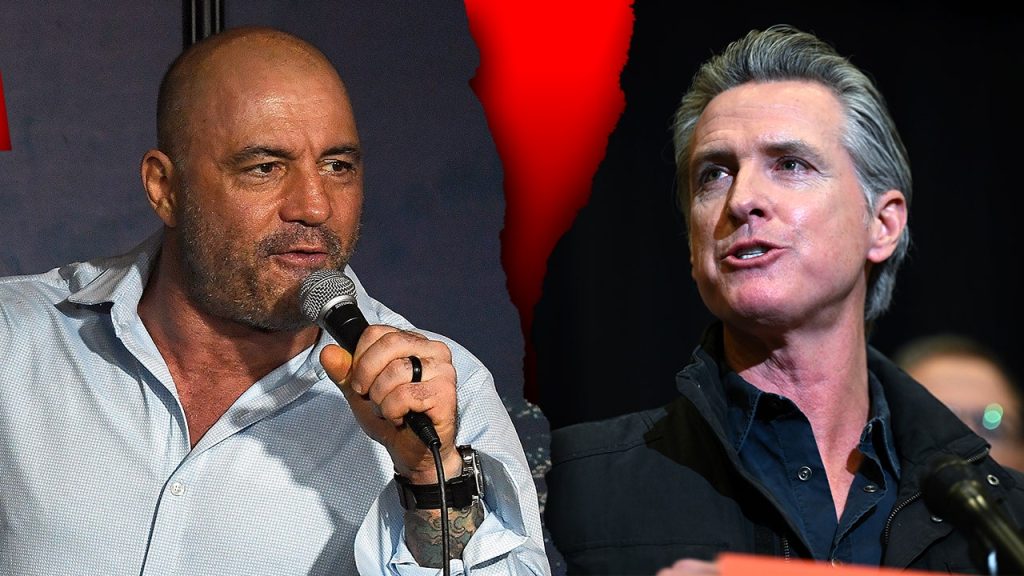In a recent podcast interview, California Governor Gavin Newsom faced scrutiny over his COVID-19 response from host Joe Rogan. During the exchange, Newsom was asked pointed questions regarding the implications of vaccine mandates for children and the responsibilities for pandemic policies that have become contentious. This discussion is particularly significant as Newsom is seen as a potential candidate for the 2028 presidential election, making his handling of the pandemic a focal point of his leadership narrative.
| Article Subheadings |
|---|
| 1) Newsom’s Interaction with Rogan |
| 2) Accountability for Vaccine Mandates |
| 3) Critical Reflections on Leadership |
| 4) The Objective Review Initiative |
| 5) Perception of California’s Pandemic Policies |
Newsom’s Interaction with Rogan
Governor Gavin Newsom participated in a podcast hosted by former U.S. Navy SEAL Shawn Ryan, where he engaged in a conversation with notable media figure Joe Rogan. The platform provides Rogan the opportunity to engage with a diverse audience, which includes listeners from across the political spectrum. Newsom’s candid remarks and his willingness to appear on a platform often criticized for its contrarian views signify a strategic approach to enhance his visibility ahead of the 2028 presidential elections. The interview provided a platform for Newsom to discuss not only his political opinions but also personal experiences that have shaped his views during a challenging time for the state.
Accountability for Vaccine Mandates
One of the most pressing inquiries posed by Rogan revolved around the responsibility for the COVID-19 vaccine mandates for children.
“Who will be held accountable for mandating COVID-19 vaccines for children, which were unnecessary and ineffective?”
This question underscored growing public concern about the potential long-term effects of these mandates and their health outcomes. Newsom responded with a defensive stance, indicating that he deemed the vaccines to be essential for public health. He reassured listeners of his commitment to consult scientific data and advisory panels, which he states guided his decisions during the pandemic.
Critical Reflections on Leadership
When discussing his leadership during the pandemic, Newsom acknowledged that hindsight offers clear perspectives that may not have been available during the crisis. He admitted that certain decisions might require reevaluation. For example, he mentioned the closure of outdoor spaces, such as beaches, as a decision he might reconsider in a future crisis.
“I know everyone’s a Godd— genius now in hindsight,”
he stated, referring to critiques he faces regarding the decisions made. This acknowledgment plays into the narrative that leaders often make decisions based on the context and information available at the time—an aspect often overlooked in retrospection.
The Objective Review Initiative
In an effort to maintain transparency, Newsom mentioned that California is undertaking an “objective review” of its pandemic policies. This review is intended to evaluate the effectiveness of interventions, comparing them to measures implemented in other states. He expressed a desire for this report to be completed imminently, aiming to provide clear insights into both the successes and shortcomings of California’s pandemic response.
“It’s going to be done next month. And it’ll be the only state that I know of that is putting out a truly objective review of what went right and what went wrong,”
he elaborated, illustrating his commitment to accountability.
Perception of California’s Pandemic Policies
Despite criticism, Newsom contended that California’s harsh restrictions were often unjustly vilified. He pointed to the actions of states like Florida and asserted that California was not alone in adopting stringent measures during the early phases of the pandemic. He noted that public perception, labeled as ‘California Derangement Syndrome,’ often obscured the complexities of decision-making amid unprecedented challenges. This narrative shifts some of the blame onto a general climate of discontent toward California’s government decisions and paints his leadership in a more favorable light by emphasizing the collective nature of the crisis.
| No. | Key Points |
|---|---|
| 1 | Governor Gavin Newsom faced challenging questions from Joe Rogan about his pandemic decisions. |
| 2 | The accountability for COVID-19 vaccine mandates for children remains a contentious issue. |
| 3 | Newsom reflected critically on his decisions, acknowledging the difficulty of leadership during a crisis. |
| 4 | California plans an “objective review” to assess pandemic policies transparently. |
| 5 | Newsom emphasized that California’s pandemic response should be viewed in a broader national context. |
Summary
In conclusion, Governor Gavin Newsom‘s engagement with Joe Rogan highlights essential discussions surrounding accountability and public health policy during the COVID-19 pandemic. As he navigates scrutiny over his decisions, the upcoming objective review promises to create a clearer picture of California’s pandemic experience. This episode not only showcases the complexities and challenges of political leadership in health crises but also positions Newsom strategically as he prepares for potential future elections.
Frequently Asked Questions
Question: What were the key concerns raised during the podcast?
The primary concerns involved the accountability for COVID-19 vaccine mandates for children and a reflection on the decisions made during the pandemic.
Question: How did Newsom respond to accusations of being influenced by pharmaceutical companies?
Newsom denied succumbing to pharmaceutical interests, highlighting progressive laws he has enacted against Big Pharma.
Question: What does Newsom’s objective review aim to achieve?
The objective review aims to evaluate California’s COVID-19 response by comparing its outcomes with those of other states, promoting transparency and accountability in public health policy.


